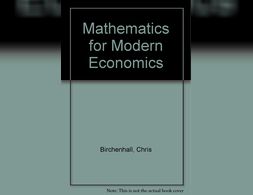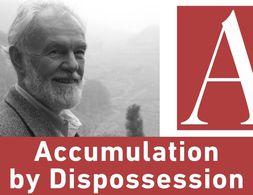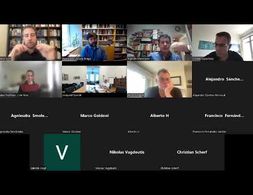✕
357 results
This course provides future change makers in public and private sectors with a comprehensive overview on the structures and actors that shape markets.
The core idea of ecological economics is that human economic activity is bound by absolute limits. Interactions between the economy, society and the environment are analysed, while always keeping in mind the goal of a transition towards sustainability.
In this overview paper, Laura Porak reviews the history of industrial policy in the European Union before the background of a Cultural Political Economy approach.
This article outlines the fundamental challenges of democratically planned economies and categorises proposed models into six groups, each of which approaches planning and coordination at different levels of authority and between myriad economic units in a particular way, taking into account efficiency as well as democratic principles and environmental and social sustainability. Through a classification system based on decision-making authority and mediation mechanisms, the article provides a framework for understanding and comparing these models. By examining their different approaches, it offers insights into the complexities and potential paths of democratically planned economies in the 21st century.
This course will survey contemporary heterodox approaches to economic research, both from a microeconomic and a macroeconomic perspective. Topics will be treated from a general, critical, and mathematical standpoint.
To what extent does gender affect people's patterns of labor force participation, educational preparation for work, occupations, hours of work (paid and unpaid) and earnings?
Designed to give second-year undergraduates an intuitive understanding of basic mathematical techniques, and when and why they are applicable. Building on the traditional framework of calculus, the notion of a concave function is used to link the new algebraic methods with the more familiar graphical approachoand to introduce the modern use of duality in economic analysis.
This article reviews insights of existing literature on global care chains. A specific focus is laid on the impact that the refugee crisis has on global care chains and in turn how the crisis impacts the de-skilling of the women in the migrant workforce.
Towards a post-work future: a necessary agenda to reconcile feminist & ecological concerns with work
In this essay the author outlines the basis for embracing a post-work agenda, rooted in an emancipatory potential from the domination of waged work, which could help answer both feminist and ecological concerns with work.
As seen with the United Nations significant promotion of the Sustainable Development Goals (SDGs) in the past few years, the issue of global development is of growing concern to many international organizations. As humanity continues to become more interconnected through globalization, the inequalities and injustices experienced by inhabitants of impacted countries becomes increasingly clear. While this issue can be observed in the papers of different types (e.g., different schools of thought) of economists throughout the world, the work of behavioral and complexity economists offer a unique, collaborative perspective on how to frame decisions for individuals in a way that can positively reverberate throughout society and throughout time.
In this essay the author reviews empirical studies in economics that analyze factors behind the rise of nationalist and populist parties in Western countries. He stresses that economic factors (e.g., trade shocks and economic crisis) play a crucial role in the rise of populist parties; however, the discussion of mechanisms driving this trend remains unsatisfying
Feminist economics is a key component of the movement for pluralism in economics and one that has, to some extent, been acknowledged by the mainstream of the profession. It seeks to highlight issues which affect women because (it claims) they have not traditionally been recognised in a field dominated by men. On top of this, it seeks to carve out a space for women in the discipline, both for intrinsic reasons of fairness and diversity and because it means that women’s issues are more likely to be highlighted going forward.
The premise of this workshop is that we, as knowledge producers - especially within westernized universities (Grosfoguel, 2013), are significantly implicated in neoliberal imaginaries that are often in service of hierarchical, binary, competitive and linear narratives of growth as civilizational progress.
This course will fundamentally ask whether we can, or even should use the word ‘decolonising’ in our pursuit of a better economics?
The lectures were given by Steve Keen at the Exploring Economics Summer Academy 2017 in the workshop on Post Keynesian Economics The first lectures start with the role of money in a monetary economy and explain the macroeconomic significance of admitting the reality that banks create money The lectures continue …
In this short lecture the marxist economic geographer David Harvey explains how his theory of The accumulation of dispossession came about and its central principles The theory builds on Marx law of the centralisation of capital arguing how the accumulation no longer stems from producing rather through trading asset values …
This course is intended to present some of the main ideas underlying the micro aspects of gender economics. The courses will tackle issues as fertility, marriage, women labor force participation, wage gap, gender inequality, violence against women and women empowerment within her household and within the society where she lives.
Along with addressing core conceptual issues in defining heterodox economics, we will cover in some detail five heterodox traditions in economics: Marxian Economics, Institutional Economics, Post-Keynesian Economics, Feminist Economics, and Ecologi-cal Economics. In the first class meeting, we discuss the structure and goals of the course, as well as the expectations and requirements from the students. In addition, we will discuss the concept of heterodoxy in economics, along with discussing the concepts and key issues in mainstream and neoclassical economics.
Pluralism includes mainstream economics. Our campaign for pluralism, including this series, have generally focused on ideas outside the mainstream on the basis that it gets plenty of attention already so we want to spend our time exposing people to alternatives. Nevertheless, mainstream ideas deserve some attention. On top of this, a curious feature of modern economics education is that some of the best ideas from mainstream economics are not even taught to undergraduates! During this series I will explore such ideas, starting today with the market construction technique known as ‘matching’.
The workshop introduces into the field of critical political economy and tries to identify the role of finacial markets in capitalism, the reason for financial crises and the relevance of Marx in regard to these topics.
This is the second part of the seminar A Hard Currency of Politics The discussion centers on the The Currency of Politics by Stefan Eich and is hosted by the journal European Law Open Stefan Eich s presentation of his argument starts at minute 7 53 The discussion centers on …
Is capitalism the context where gender inequalities are reproduced, or is capitalism something more than a context? What are the differences among women and how can we place them theoretically and politically. Reproductive work, is it a women’s work? These questions are disscused in a three-session workshop.
Though apparently siblings from the same family, New Keynesianism and Post-Keynesianism are completely different schools of economic thought. As to why and in what regard exactly, that is what this book is all about. While the former is the official label of the current mainstream in economic research and teaching (rather than neoclassic economics, which would be more apt a term), the latter tries to preserve the original thinking of John Maynard Keynes, but also additional ideas and concepts of all those building on his work.
This brief responds to the criticism that mainstream economics is currently facing due to its heavy reliance on models and narrow range of quantitative research techniques. It takes a broader view, identifying issues that are also relevant for heterodox and pluralist approaches to economics.
Economics has become a monolithic science, variously described as formalistic and autistic with neoclassical orthodoxy reigning supreme. So argue Dimitris Milonakis and Ben Fine in this new major work of critical recollection.
Once in a while the world astonishes itself. Anxious incredulity replaces intellectual torpor and a puzzled public strains its antennae in every possible direction, desperately seeking explanations for the causes and nature of what just hit it. 2008 was such a moment. Not only did the financial system collapse, and send the real economy into a tailspin, but it also revealed the great gulf separating economics from a very real capitalism.
Macroeconomics is fundamental to our understanding of how the world functions today. But too often our understanding is based on orthodox, dogmatic analysis.
Modern Monetary Theory and the Birth of the People s Economy The leading thinker and most visible public advocate of modern monetary theory the freshest and most important idea about economics in decades delivers a radically different bold new understanding for how to build a just and prosperous society Stephanie …
Within the heterodox field one of the most active topics is related to the theory of economic growth and distribution This is a textbook for advance undergraduate and graduate students Throughout its 18 chapters Classical Neoclassical and post Keynesian models are developed Each chapter contains study problems and suggested readings …
This unique up-to-date volume not only provides state-of-the-art discussions of the most recent developments in modern macroeconomics but also includes a series of interviews with leading economists that shed new light on the major intellectual and policy issues of the 1990s. The book is at once an invaluable text and a superb overview that will be welcomed by teachers and students alike.
How the brain works, how we learn, and why we sometimes make stupid mistakes.
This article, looks at the complex interaction between an urban economy and the vegetation within that urban area. In summary, numerous studies have found a positive link between increased vegetation and social as well as personal health. It makes a case for increasing urban vegetation as a way to benefit local economies.
We use cookies on our website. Click on Accept to help us to make Exploring Economics constantly better!
























